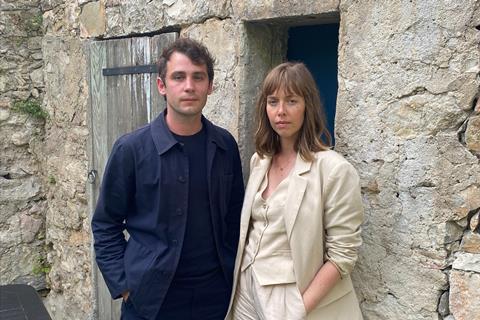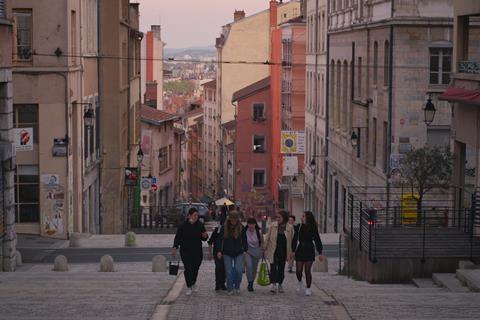
”We are feminist, riposte feminist!” This was the audience’s echo of the activists’ cheers and chants in the standing ovation that greeted the premiere of Feminst Riposte, the feature documentary of French filmmakers Marie Perennès and Simon Depardon.
The film is showcased in the Special Screenings section at the Cannes Film Festival this week.
The documentary sees first-time director Perennès and Depardon, for whom this is his second film, shine a light on the nocturnal campaigners attempting to awaken the public and turn ripples of activism into a new wave of disruptive feminism in France. They follow the groups, known as the ’collage movement’, who are taking to the streets of France at night to paste messages and slogans in public spaces as tributes to and a cry of outrage for the victims of femicide.
The directors plan on meeting the public and organisations to exchange ideas and debates throughout France when the film is released. Some members of the movement protested on the red carpet at Cannes, ahead of the Competition screening of Holy Spider. Wild Bunch International is handling sales on both titles.
Perennès and Depardon talk to Screen about the power of silent observation, doc techniques to engage male audiences and the role of allies in the fight for gender equality.
What made you want to tell this story?
Perennès: When the ‘collage’ movement started in France, I was astonished by their courage, determination, and [the power of] slogans like ‘I believe you.’ I went to do a collage with groups, but I really felt that with a camera, it’s another tool to speak in. I can help build a new deconstruction and a new way of thinking about equality.
How did you make this documentary accessible to every type of audience?
Perennès: The activists we filmed are mostly between 18 and 25. Our producer Claudine Nougaret is part of a generation that fought during the 70s and 80s for feminism. We thought it would be wonderful to do a transgenerational movie that speaks to all ages. To bridge that gap in the middle. And we hope it will reach men too. That’s the reason we decided to both direct the film.
Feminist Riposte has no documentary-style piece to camera interviews. Why?
Depardon: We tried not to do any face-to-camera interviews because I think men will not listen. It would intimidate them. The idea was more to be like a mouse in the conversation, in the debates, in the action. It was trying to disappear behind the camera to let them have their own conversation and let the viewers form their own opinions.
We said to the girls, ‘no looking at the camera. Silence is good. We can edit.’ It was really something that we tried to do like a movie, like a fiction. In every scene you’re in the conversation and in the secret. Because, you know, feminism is all about secrets sometimes, like the echo of the witches doing things in the night.

How did the confrontation with the pro-life activists happen? Did you know they were going to be there?
Perennès: It was a total coincidence. All the activists didn’t know either. They always try to keep the feminists silent. That’s why we did the movie—a film with only women speaking so no one can shut them down.
Depardon: It’s about sound, too. He’s praying and the feminists are shouting, so we did a lot in post-production to have this scene. You have to be really quick to change position and film what’s happening. And it’s what we love in documentary - a confrontation like this because we began to speak about violence and how in some movements, you need some violence to be listened to. So it opened up a really good debate.
Simon, do you describe yourself as a feminist?
I’m an ally because I don’t suffer from the patriarchy, so my way of engaging is to do movies because it’s my work. I learned that there are more than 100 women in France dying every year just for being women. We have to do things. I can be an ally with my camera.
What impact do you hope Feminist Riposte will have?
Depardon: We hope it will open debates. Feminism has to be everywhere and we have to speak about it. People will have to see them and see people fighting in France. We’ve received a lot of messages already from people all around the world saying, “I want to do collages”.
Perennès: We hope the film will be a tool to discuss, open minds, and engage debates. There is hope.















![[L-R]: Amanda Villavieja, Laia Casanovas, Yasmina Praderas](https://d1nslcd7m2225b.cloudfront.net/Pictures/274x183/6/4/1/1471641_pxl_20251224_103354743_618426_crop.jpg)









No comments yet